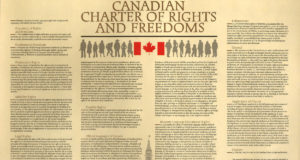On July 26, 2019, in R. v. Stillman, 2019 SCC 40,the Supreme Court of Canada held by a 5-2 majority that a member of the Canadian Forces does not have the right to trial by jury for a “civilian” criminal offence for which they are charged under the National Defence Act (the “NDA”). Section 130(1)(a) of the NDA converts any ...
Read More »Recent Posts
Constitutional Democracy Under Stress: Developing A Resistance To Unaccountable Government
One of the litmus tests of the legitimacy of any government that presides over a “democracy”, is the extent to which it is genuinely and adequately accountable to its citizens. While this may seem a trite observation, it has sadly become normal, within so-called democratic societies, to find governments that are wanting in the accountability department. In Ontario, for example, ...
Read More »Deconstructing Section 28
Professor Kerri Froc has written a thoughtful guest post for Double Aspect, in which she argues that s. 28 of the Charter is not merely an interpretive provision, but is rather a substantive and justiciable section in its own right. The implication if she is correct should not be understated. Section 28 states: Notwithstanding anything in this Charter, the rights ...
Read More »ARL Celebrates Five Years and Charitable Status
Five years ago, I founded Advocates for the Rule of Law with a small group of like-minded lawyers. We were concerned with what we perceived to be a growing disregard for the rule of law, and a move toward what some – including most notably, Justice Abella of the Supreme Court of Canada – have called the “rule of justice.” ...
Read More »Losing Rights in the Balance
Back in 2008, the College of Physicians and Surgeons of Ontario (CPSO) issued a new policy entitled “Physicians and the Ontario Human Rights Code.” That policy informed physicians that they should be prepared to “set aside their personal beliefs” in providing healthcare. It warned that the Human Rights Code has no defence for discriminatory refusals of medical services, “even if the refusal is ...
Read More »The Political Consequences of Deference are not Always the Same
In my last post on this blog, I commented and mostly praised two recent blog posts at Double Aspect by Mark Mancini from earlier this month calling for less deference to administrators in judicial review, unless a statute explicitly calls for such deference. But after I began drafting my response, a new development arose that now calls for a brief ...
Read More »Deference to Administrators Must be Legislated not Assumed
Earlier this month, Mark Mancini wrote two very thoughtful blog posts on the Double Aspect blog, attempting to bring administrative law back to first principles. These intriguing posts are worthy of commentary. I will respond to Mancini’s two posts today, and follow up next week with an addendum in light of the Supreme Court of Canada’s recent decision in Canada ...
Read More »Abdicating Legislative Power: The Carbon Tax Case
If there is one aspect of Canadian administrative law that is relatively understudied, it is the constitutionality (or, less ambitiously, the desirability) of the delegation of legislative power from Parliament to the Cabinet and administrative actors. The recent Saskatchewan Carbon Tax Reference puts into stark relief the underdeveloped nature of the law in this area, and the stakes underlying the ...
Read More »The Original Meaning of Military Law
Advocates for the Rule of Law returned to the Supreme Court of Canada last month in the Stillman and Beaudry appeals to make important submissions on the topic of stare decisis. I attended with my co-counsel, Adam Goldenberg and Peter Grbac. Mr. Goldenberg’s oral submissions were stellar and the panel kept him up for an additional few minutes to ask him ...
Read More »The “Return” of “Textualism” at the SCC?
Under the so-called “modern approach” to statutory interpretation, courts are instructed to take into account the text, context, and purpose of a statute. But perhaps because the “text, context, and purpose” recital is so commonplace, other difficult interpretive questions are masked under its patina. For example, which takes priority—text or purpose? The Supreme Court has said that clear text is ...
Read More » Advocates for the Rule of Law
Advocates for the Rule of Law









